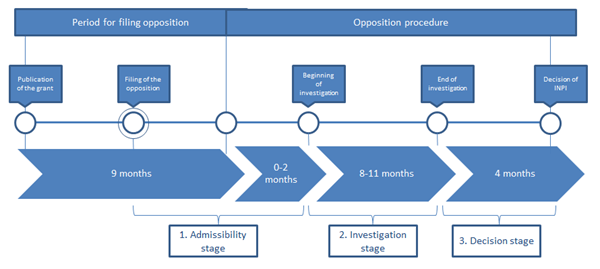Since April 1, 2020, it is possible to file an opposition against a French patent, before the French Patent Office (INPI). This new procedure is part, with the examination of inventive step[1] and the reform of the utility certificate[2], of the specific intellectual property provisions of the PACTE law (“Plan d'Action pour la Croissance et la Transformation des Entreprises”, Action Plan for Growth and Business Transformation), promulgated by Parliament on May 22, 2019.
The opposition procedure enables a third party to challenge the validity of a patent, avoiding costly and lengthy legal action, and for which an interest in bringing an action is requested.
The Intellectual Property Code, as amended by the PACTE law, unveils the outline of the procedure. Guidelines for opposition, providing more details on the procedure, are also being prepared.
The opposition may be directed to all or part of the granted patent, and may only be based on one or more of the following grounds:
- the subject-matter of the patent is not patentable, in particular for lack of novelty or inventive step;
- the patent does not disclose the invention in a manner sufficiently clear and complete for it to be carried out by a person skilled in the art;
- the subject-matter of the patent extends beyond the content of the application as filed, or, if the patent was granted on a divisional application, beyond the content of the earlier application as filed.
The opposition procedure is applicable to the patents for which the grant mention is published in the Official Bulletin of Industrial Property from April 1, 2020. Opposition requests are made only electronically, on the dedicated portal, which is accessible from INPI website.
The procedure consists in three stages:
- the admissibility stage ;
- the investigation stage;
- the decision stage.
The different stages of the opposition procedure, as well as the corresponding deadlines, are summarized below:

To be admissible, the request for opposition must include the following elements: the identity of the opponent, the references of the opposed patent, a declaration specifying the extent to which the patent is opposed, the grounds for opposition, the justification of the payment of the fee (600 €, against 785 € for the opposition before the EPO), and, if necessary, the designation of a representative.
Once the request for opposition has been considered admissible, the investigation may begin. The investigation stage itself includes the following four stages:
- A stage of information and collection of the opinion of the patentee: INPI sets the patentee a time limit within which the patentee shall provide comments to INPI in response to the request for opposition, or propose amendments of the patent.
- A stage of preparation of the investigation notice by INPI: this notice is drawn up on the basis of the elements provided by the parties (opposition statement and comments of the patentee). The parties are given a new deadline to present their observations or, in the case of the patentee, to propose amendments to the amended patent.
- A written stage: the parties are invited, within a specified time limit, to respond to the investigation notice drawn up by INPI.
- An oral phase. At the end of the written phase, each party may request to submit oral observations. INPI may also invite the parties to present oral observations if it considers it necessary for the purposes of the investigation.
INPI finally rules on the opposition in view of all the written and oral observations. It is important to note that the opposition is deemed rejected if INPI has not acted within four months from the date of the end of the investigation phase. This provision makes, on the one hand, the opponent bear the consequences of a breach of INPI. On the other hand, it ensures a fast treatment of the opposition.
This new procedure lasts at most fifteen months between the start of the investigation and the decision of INPI.
A party wishing to appeal against INPI's decision must do so before the Paris Court of Appeal. The parties, as well as INPI (which is not party to the proceedings) may then lodge an appeal in cassation, which is the highest court in France.
In conclusion, the implementation of this simple, rapid and inexpensive procedure should ultimately lead to a strengthening of the presumption of validity of French patents, which will help patentees to assert their rights.
[1] examination of inventive step: patent applications which are filed on or after May 22, 2020 may be rejected for lack of inventive step. Previously, only the unambiguous lack of novelty could be retained by the examiner
[2] reform of the utility certificate: the term of protection of utility certificates, which are distinguished from patents by the absence of a search report, goes from six to ten years. It is also now possible to transform a utility certificate application into a patent application, for utility certificate applications filed since January 11, 2020. A utility certificate may not be challenged through the opposition procedure, which raises its attractiveness.


